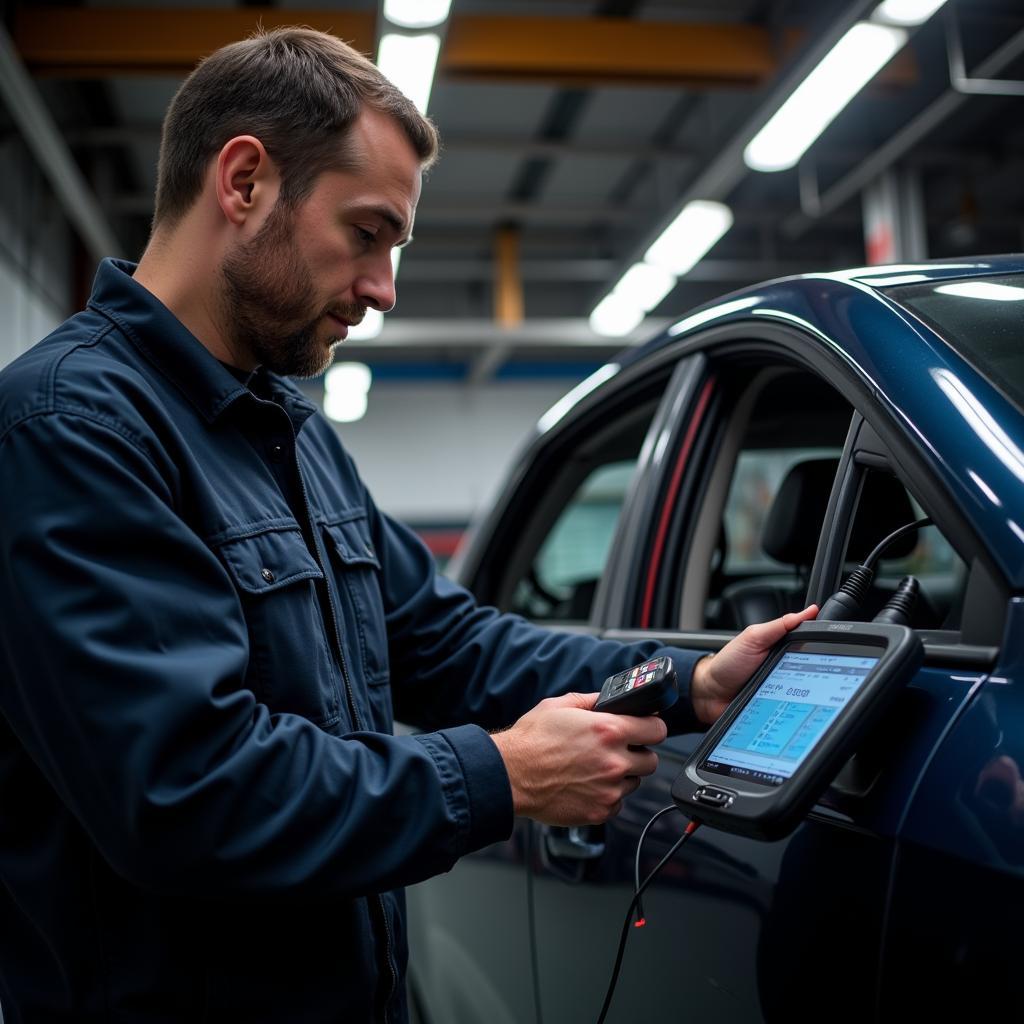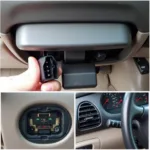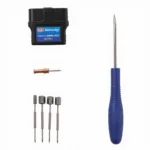Your OBD2 Bluetooth scanner should be a gateway to understanding your car’s engine control unit (ECU), but what happens when it won’t connect? This issue can be frustrating, especially when you’re trying to diagnose a car problem. In this comprehensive guide, we’ll explore the common reasons why your OBD2 Bluetooth scanner might not be connecting to the ECU and provide you with effective solutions to get you back on track.
Understanding the Basics: OBD2, Bluetooth, and ECU
Before we delve into the troubleshooting steps, let’s clarify the key components involved:
- OBD2 (On-Board Diagnostics II): A standardized system in vehicles manufactured after 1996 that allows external devices, like scanners, to access diagnostic information from the ECU.
- Bluetooth: A wireless technology enabling short-range communication between devices, like your smartphone and the OBD2 scanner.
- ECU (Engine Control Unit): The “brain” of your car’s engine, responsible for managing various systems and storing diagnostic data.
Common Causes and Solutions for OBD2 Bluetooth Connection Problems
Here are the most common reasons why your OBD2 Bluetooth scanner might not connect to your car’s ECU, along with detailed solutions:
1. Bluetooth Pairing Issues
Problem: The scanner and your smartphone or tablet haven’t been paired correctly.
Solution:
- Make sure Bluetooth is enabled on your device.
- Put your OBD2 scanner in pairing mode (refer to the scanner’s manual).
- Search for available Bluetooth devices on your phone and select the scanner.
- Enter the pairing code if prompted (usually found in the scanner’s manual).
2. Incorrect OBD2 App
Problem: You might be using an incompatible or outdated app with your OBD2 scanner.
Solution:
- Ensure you are using the correct app recommended by the scanner manufacturer.
- Check for updates in the app store and install the latest version.
3. Faulty OBD2 Scanner or Port
Problem: The scanner itself or the OBD2 port in your car could be faulty.
Solution:
- Test the Scanner: Try the scanner on another vehicle. If it connects, then the problem is likely with your car’s OBD2 port.
- Check the OBD2 Port: Inspect the port for any damage, debris, or loose connections. If you find any, try cleaning the port carefully or consult a mechanic.
- Consider a Replacement: If you suspect the scanner is faulty and it’s still under warranty, contact the manufacturer for a replacement.
4. Blown Fuse
Problem: The fuse linked to the OBD2 port might be blown, disrupting power supply.
Solution:
- Locate your vehicle’s fuse box (check your owner’s manual).
- Find the fuse related to the OBD2 port (usually labeled as “CIG” or “ACC”).
- Inspect the fuse for any breaks in the wire. If it’s blown, replace it with a new fuse of the same amperage.
5. ECU Communication Errors
Problem: The ECU might be experiencing communication errors, preventing data transmission.
Solution:
- Turn Off and Restart: Sometimes, a simple reset can solve temporary glitches. Turn off your car’s ignition, wait for a few minutes, and then restart it.
- Check for Diagnostic Trouble Codes (DTCs): If the issue persists, you might need to have your car scanned for DTCs by a mechanic, as this could indicate a more serious problem with the ECU.
6. Incompatible Vehicle
Problem: While rare, some vehicles, especially older models, might have compatibility issues with certain OBD2 scanners.
Solution:
- Check Compatibility: Consult your scanner’s manual or the manufacturer’s website to verify its compatibility with your car’s make, model, and year.
- Seek Expert Help: If you suspect compatibility issues, consult a qualified mechanic or an automotive electrician for assistance.
FAQs: OBD2 Bluetooth Connection Problems
Q: My OBD2 Bluetooth scanner was working before, but now it’s not connecting. What could be wrong?
A: Check for simple issues first, like Bluetooth pairing problems or a blown fuse. If those aren’t the culprit, a change in your phone’s OS or the scanner’s firmware might have caused compatibility issues. Ensure both are up-to-date.
Q: How do I know if my OBD2 Bluetooth scanner is compatible with my car?
A: The best way is to refer to your scanner’s documentation or the manufacturer’s website. They usually provide a list of compatible vehicles. You can also search online forums or contact the manufacturer’s customer support for help.
Q: What should I do if I’ve tried everything and my OBD2 Bluetooth scanner still won’t connect?
A: At this point, it’s best to consult a professional mechanic. They have the expertise and tools to diagnose more complex issues with your car’s electrical system or ECU that might be preventing the connection.
 A mechanic using a professional OBD2 scanner to diagnose a car's engine.
A mechanic using a professional OBD2 scanner to diagnose a car's engine.
Need More Help?
If you’re struggling to get your OBD2 Bluetooth scanner connected to your car’s ECU, don’t hesitate to contact our team of experts. We offer 24/7 support via WhatsApp at +1(641)206-8880 or email us at [email protected].
We’re here to help you get the most out of your OBD2 scanner and keep your car running smoothly!

